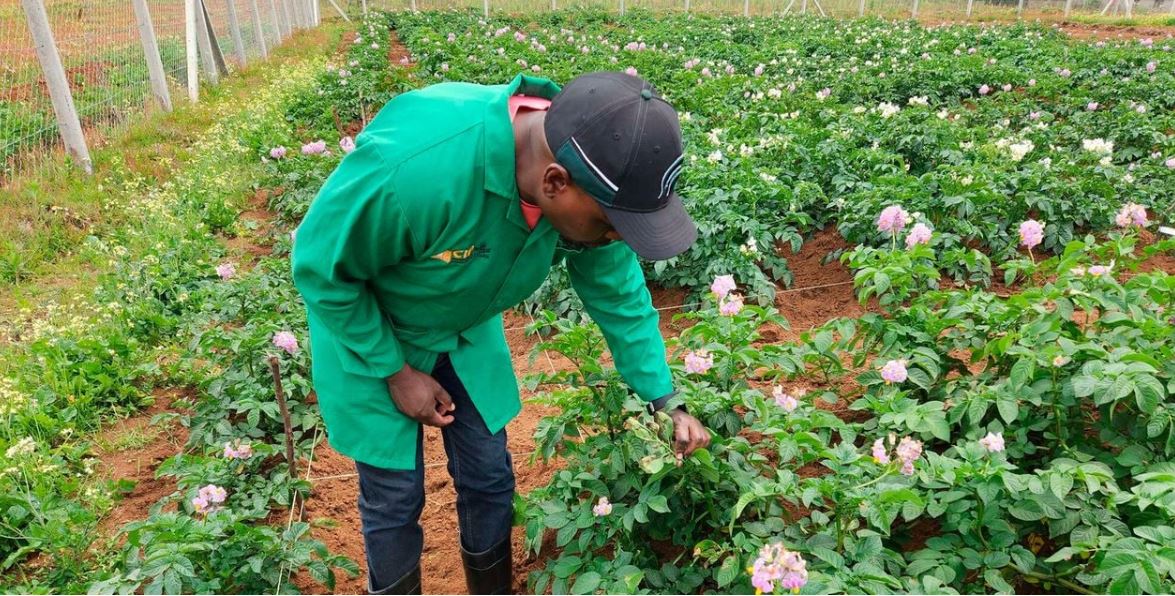Kenyan potato farmers may soon benefit from a genetically modified (GM) potato variety that offers increased yields and resistance to late blight disease.
The GM potato, developed through the ‘Global Biotech Potato Partnership,’ is tolerant to late blight disease, which traditionally leads to significant crop losses. With the new variety, farmers can expect improved yields without the need for chemical sprays.
Read also: Kenya, US jointly announce $12.8 million investments in agriculture
Promising Field Trials in Uganda, Kenya, and Nigeria
The ‘Global Biotech Potato Partnership’ conducted confined field trials in Uganda, Kenya, and Nigeria, with promising results. These trials, initiated in May the previous year, have shown significant potential for the GM potato variety. Researchers from Michigan State University are coordinating the project in collaboration with the Kenya Agricultural Livestock Research Organization (KALRO), Africa Agricultural Technology Foundation, International Potato Centre, and other partners.
Enhanced Resistance to Late Blight Disease
The GM potato variety has been developed using genes from wild potatoes. These genes were transferred through agrobacterium-mediated genetic transformation, resulting in a potato variety that is resistant to late blight disease caused by Phytophthora infestans. As a result, farmers can reduce their reliance on harmful chemicals to control the disease.
Potential for Higher Yields
According to Dr. Eric Magembe, the lead researcher in the project, potato farmers in Kenya currently harvest up to 10 tonnes per hectare due to late blight disease. With the GM variety, they can expect significantly higher yields of over 40 tonnes per hectare without chemical sprays or other costly agricultural practices. Late blight is responsible for annual potato losses ranging from 15 to 30 percent worldwide.
Regulatory Approval and Commercialization
The researchers are working on a regulatory report to be submitted to the National Biosafety Authority, the regulatory body responsible for considering the variety’s release. Once approved, the GM potato variety will undergo National Performance Trials conducted by the Kenya Plant Health Inspectorate Service. The researchers hope to see the GM potato commercialized within the next two years.
Biotech crops have been a topic of debate, with proponents emphasizing the opportunities they offer for addressing production challenges, while opponents have raised concerns about safety, both for humans and the environment. The Environment and Lands court recently dismissed a petition by the Law Society of Kenya challenging the government’s decision to lift the ban on genetically modified (GMO) foods in the country. The Cabinet approved the lifting of the 10-year ban on GMO foods in Kenya in October the previous year, allowing for a case-by-case assessment of GMOs.
In December 2019, the Cabinet approved commercial farming of BT cotton, partially lifting the ban on GMOs that had been in place since 2012. The government aims to allocate at least 200,000 acres to commercial BT cotton production to revitalize the local textile sector.
Agro-financing startup Emata secures $2.4 million for expansion
Understanding Genetically Modified Crops
Genetically modified crops (GM crops) are plants used in agriculture whose DNA has been modified using genetic engineering methods. This genetic manipulation can be achieved through physical methods or by utilizing Agrobacterium for the delivery of specific sequences contained in T-DNA binary vectors. The primary objective in most cases is to introduce a new trait to the plant that does not naturally occur in the species.
Applications of GM Crops
The applications of genetically modified crops are diverse and include both food and non-food crops. In food crops, genetic modification can provide resistance to pests, diseases, and adverse environmental conditions. It can also reduce spoilage, confer resistance to chemical treatments (e.g., herbicides), or enhance the nutrient profile of the crop. In non-food crops, genetic modification can be employed for the production of pharmaceutical agents, biofuels, and other industrially useful goods. Additionally, GM crops can play a role in bioremediation, helping to clean up contaminated environments.




